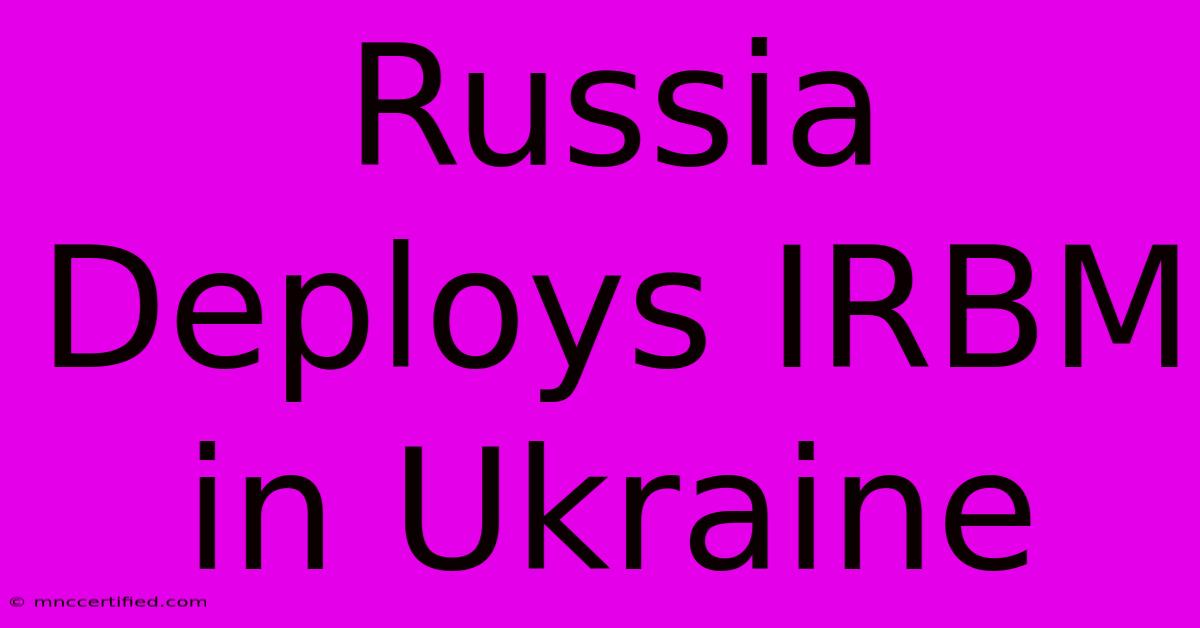Russia Deploys IRBM In Ukraine

Table of Contents
Russia Deploys IRBM in Ukraine: Analyzing the Implications
The potential deployment of Intermediate-Range Ballistic Missiles (IRBMs) by Russia in the ongoing conflict in Ukraine represents a significant escalation with far-reaching implications for regional and global security. While concrete evidence of such deployment remains contested, the very possibility necessitates a thorough examination of the potential consequences. This article will delve into the current situation, exploring the implications of this potential development on the battlefield, the geopolitical landscape, and the future of arms control.
The Claim and the Evidence: Examining the Allegations
Reports suggesting Russia's deployment of IRBMs in Ukraine have surfaced through various channels, including intelligence reports and media outlets. However, verifying these claims definitively remains a challenge. Independent verification is crucial, and the lack of concrete, publicly available evidence leaves room for doubt and necessitates cautious interpretation. The ambiguity surrounding the deployment underscores the need for increased transparency and independent monitoring of the conflict.
Analyzing the Potential Missiles: What We Know (and Don't Know)
Several missile systems fall within the IRBM category, and attributing specific weapons to Russia's potential deployment requires careful analysis. Factors such as range, payload capacity, and guidance systems are vital in identifying the precise weapons involved. The lack of readily available information about specific missile types deployed makes assessing the impact challenging. Open-source intelligence (OSINT) analysis plays a vital role, but it requires careful cross-referencing and critical evaluation.
Implications of IRBM Deployment: A Multifaceted Analysis
The consequences of Russia deploying IRBMs in Ukraine are multifaceted and potentially devastating.
Military Implications: Shifting Battlefield Dynamics
The deployment of IRBMs could significantly alter the dynamics on the battlefield. Their extended range would allow Russia to strike targets deep within Ukrainian territory, potentially impacting critical infrastructure and military installations. This could also lead to an increase in civilian casualties, pushing the conflict into a more destructive phase. Ukraine's countermeasures would need to adapt to this new threat, possibly requiring the deployment of additional air defense systems.
Geopolitical Implications: Escalation and International Response
The use of IRBMs represents a significant escalation of the conflict, potentially altering the geopolitical landscape. Such a move could trigger stronger international condemnation and sanctions, further isolating Russia on the world stage. This could also lead to increased military aid to Ukraine from NATO and other allies, potentially further escalating the conflict. The potential for miscalculation and unintended escalation remains a critical concern.
Arms Control Implications: Erosion of Existing Frameworks
The deployment of IRBMs challenges existing arms control agreements and treaties. It undermines the efforts to limit the proliferation of these weapons, potentially setting a dangerous precedent for other nations. The erosion of arms control mechanisms increases the risk of an arms race, leading to a more unstable and dangerous international security environment.
The Way Forward: Addressing the Challenges
Addressing the potential deployment of IRBMs in Ukraine requires a multi-pronged approach.
- Independent Verification: A commitment to transparent and independent verification mechanisms is crucial. International observers should have access to relevant information to ascertain the truth.
- Diplomatic Efforts: Renewed diplomatic efforts to de-escalate the conflict are vital. International pressure on Russia to adhere to international law and norms is essential.
- Strengthening Air Defenses: Ukraine requires enhanced air defense systems to counter the threat posed by IRBMs. International support in this area is necessary.
- Renewed Focus on Arms Control: A renewed focus on strengthening and enforcing existing arms control agreements is crucial to preventing further proliferation of these weapons.
The situation concerning the potential deployment of IRBMs in Ukraine is fluid and demands careful monitoring. The information presented here reflects the current understanding, which may change with further developments and the release of more information. It is crucial to maintain a cautious and fact-based approach in interpreting the situation and its implications. The potential consequences of such a deployment warrant a serious and comprehensive response from the international community.

Thank you for visiting our website wich cover about Russia Deploys IRBM In Ukraine. We hope the information provided has been useful to you. Feel free to contact us if you have any questions or need further assistance. See you next time and dont miss to bookmark.
Featured Posts
-
De Generes De Rossi Leaving Us
Nov 22, 2024
-
Business Insurance Scottsdale Az
Nov 22, 2024
-
Joint Powers Authority Insurance
Nov 22, 2024
-
How Ilm Restored Alien Romulus
Nov 22, 2024
-
Pete Wicks Jowita Relationship Update
Nov 22, 2024